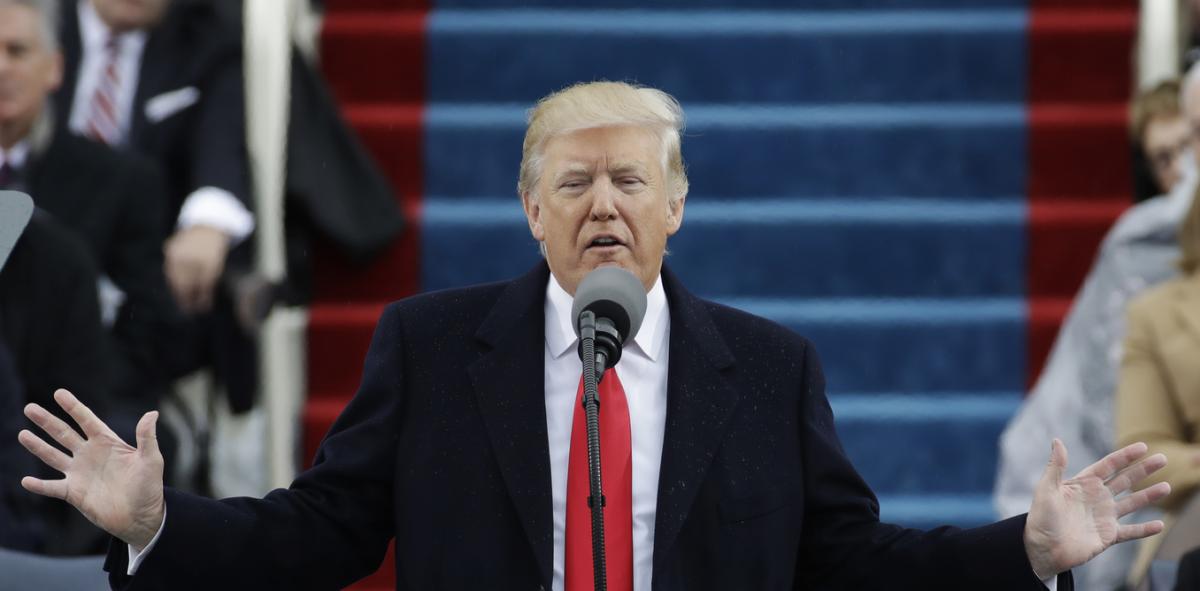If it was a call for unity, it was a divisive one

President Donald Trump delivers his inaugural address after being sworn in as the 45th president of the US. Patrick Semansky/AP Photo
President Donald Trump’s inaugural speech – a brief address, which, at 1,433 words, was the shortest since President Carter’s – combined his trademark combative populism with shades of Ronald Reagan.
Though sprinkled with calls for unity, it also relied upon creating a sharp divide between his self-declared “movement” and forces aligned with the “Washington establishment.” He also implicitly distinguished between those whom he dubbed “patriots” and everyone else.
In a sense, the speech mimicked today’s political climate. For his base, it will be received as a call for all Americans to unify around his agenda. For his opponents, it will be seen as not only negative, but divisive. Whether one believes that his speech echoed the high ideals of the Gipper or the acrimony of the campaign trail may depend on whether you are a person who believes it is once again morning in America or a person who is mourning America.
In the end, if it was a call for unity, it was a divisive one.
Still mired in campaign rhetoric
According to Karlyn Kohrs Campbell and Kathleen Hall Jamieson, two leading experts of presidential rhetoric, an inaugural address functions to: (1) bring together the country; (2) rehearse common values; (3) set forth guiding presidential principles; and (4) demonstrate the presidential persona can be competently performed. Typically, the primary purpose of unification is achieved by rehearsing common values. On that foundation the presidential principles and persona are advanced.
For this reason, inaugural speeches usually don’t name domestic enemies. Trump’s inaugural was remarkable because of his stark use of direct scapegoating.
For example, although Ronald Reagan decried the “Washington establishment” in his 1981 address, he was deliberately vague:
“From time to time we’ve been tempted to believe that society has become too complex to be managed by self-rule, that government by an elite group is superior to government for, by, and of the people.”
Trump, however, was very direct:
“For too long, a small group in our nation’s capital has reaped the rewards of government while the people have borne the cost. Washington flourished – but the people did not share in its wealth. Politicians prospered – but the jobs left, and the factories closed. The establishment protected itself, but not the citizens of our country. Their victories have not been your victories; their triumphs have not been your triumphs; and while they celebrated in our nation’s capital, there was little to celebrate for struggling families all across our land.”
The “us versus them” framing defines “the people” not by what they are for, but by whom they are against. There is a call for unity, but it’s a call for unity against the establishment and the other forces that conspire to “steal” America – American jobs, American security and American prosperity.
Of course, the unity-through-exclusion approach was the foundation of Trump’s campaign. (What else does a wall do?) And while the possibility of the political pivot has been torpedoed by the tenacity of Trump’s tweeting, it was still reasonable to expect the historical inertia of the inaugural form might even carry Trump.
Instead, the contradiction between a desire to repeat Reagan’s inaugural and a desire to repeat campaign trail performances carried the day.
A dark vision
Trump not only identified an enemy in the establishment, but, as on the campaign trail, he spent a good portion of his time focusing on a list of examples of the “the American carnage” wrought by Washington.
The list is striking for its length and detail, especially given the brevity of the address.
Trump decried that “Washington flourished, but the people did not share in its wealth”; “jobs left and factories closed” (a theme that received mention four times in the speech); “there was little to celebrate for struggling families across the land”; “forgotten men and women”; “mothers trapped in poverty”; “rusted out factories scattered like tombstones”; “an education system…that leaves our students deprived of all knowledge”; “crime and gangs and drugs that have stolen lives”; “enriching foreign industry at the expense of American industry”; “the depletion of our military”; “infrastructure that has fallen into disrepair and decay”; “the wealth, strength and confidence of our country [dissipated]”; “millions of workers left behind”; “the wealth of the middle class ripped from their homes”; and the threat of “radical Islamic terrorism.”
It is a long list, and one that is more striking for the appearance of a number of words, according to the Washington Post, that had never appeared in an inaugural before. It wasn’t just “carnage”; there was “bleed,” “sad,” “ripped,” “trapped” and “stolen.”
Is it morning in America? Or are we mourning in America?
The paradox of Trump’s address is that it broke from the more inclusive calls to national unity that previous presidents have made to all Americans, instead aligning himself and the people against an amorphously defined “establishment.”
Trump’s speech was a near-perfect example of the contradictions he will face as president. How will a candidate who has run against the establishment, who then excoriated it in his first address as president, be able to work with members of the establishment to generate a consensus around a governing agenda? Who exactly counts as “the people”?
If there was uncertainty during the transition, there’s now even more uncertainty about how President Trump will govern.
(Christian Lundberg is Associate Professor of Rhetoric, Communication Consultant, University of North Carolina – Chapel Hill)
This story was first published on The Conversation.
